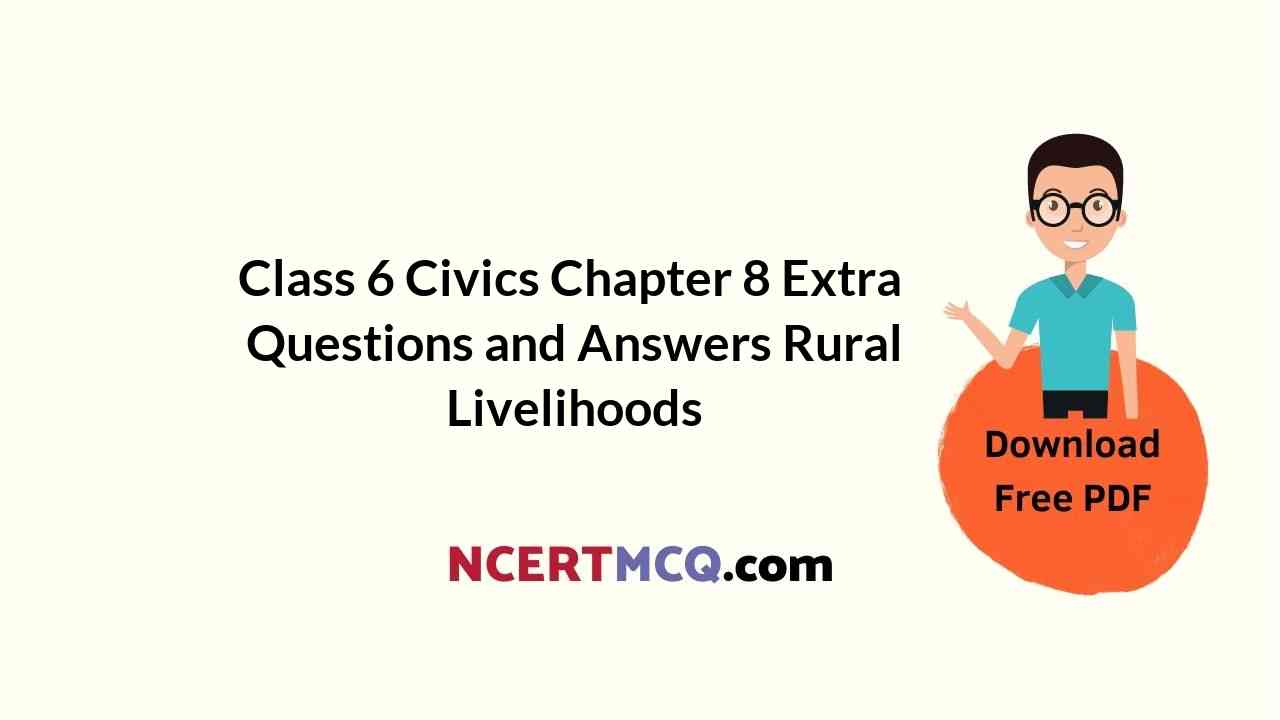Check the below Online Education NCERT MCQ Questions for Class 6 Civics Chapter 8 Extra Questions and Answers Rural Livelihoods with Answers Pdf free download. https://ncertmcq.com/extra-questions-for-class-6-social-science/
Online Education for Rural Livelihoods Class 6 Extra Questions Civics Chapter 8
I. Fill in the blanks in the following sentences with the appropriate words given in the brackets.
(a) Kalapattu is a village, that is close to the sea coast in …………………………. . (Tamilnadu/Kerala)
Answer:
Tamil Nadu,
(b) The main crop grown in the village is the …………………………. .(wheat/paddy).
Answer:
paddy
(c) ………………………….of all rural families are agricultural labourers. (Two fifths/One third)
Answer:
Two fifths
(d) In the coastal areas there are …………………………. .(paddy fields/forests/fishing villages).
Answer:
fishing villages
(e) Aruna is …………………………. and lives in the village of …………………………. . (landless worker/fisherwoman Kalpattu/Pudupet)
Answer:
fisherwoman, Pudupet.
![]()
Class 6 Civics Chapter 8 Extra Questions Question 1.
What kind of food is sold in the tea shops?
Answer:
The tea shops sell tiffins – such as idli, dosa and update in the morning and snacks like vada, bonda and Mysore Pak in the evening.
Rural Livelihood Class 6 Extra Questions Question 2.
What kind of village is Kalpattu?
Answer:
Kalpattu is a village that is close to the sea coast in Tamilnadu. The village is surrounded by low hills.
Rural Livelihood Class 6 Extra Questions And Answers Question 3.
What is the main work of the people in the village of Kalpattu?
Answer:
Paddy is the main crop that is grown in irrigated lands. Most of the families earn a living through agriculture.
Class 6 Civics Chapter 8 Extra Questions And Answers Question 4.
Name the crops, other than paddy, which are grown in the village of Kalpattu.
Answer:
The other crops grown are coconut, cotton, sugarcane, and plantain and mango, in the village of Kalpattu.
![]()
Rural Livelihood Class 6 Questions Answers Question 5.
Why does Thulasi find that the work is difficult now?
Answer:
Thulasi is growing older and bending for long hours, with feet in water is very painful.
Ncert Class 6 Civics Chapter 8 Extra Questions Question 6.
Who supervises the work in Ramalingam’s field?
Answer:
Krauth-amma, who is Ramalingam’s wife supervises the work in the field.
Rural Livelihoods Class 6 Extra Questions Question 7.
Why does Thulsai work for Ramalingam, even when he gives less wages?
Answer:
Thulasi works for less wages for Ramalingam because he calls her back whenever there is work. He does not go looking for cheap labour from other villages.
Rural Livelihood Extra Questions Question 8.
Who are agricultural labourers?
Answer:
Agricultural labourers are landless fanners, who work on the land belonging to others. Some may own small plots of land.
![]()
Class 6 Civics Ch 8 Extra Questions Question 9.
Name the group of people who provide services.
Answer:
The people who provide services are blacksmiths, nurses, teachers, washermen, weavers, barbers, cycle repair mechanics and so on. Construction workers and lorry drivers also come into this category. They are paid for the services that they provide.
Class 6 Civics Chapter 8 Worksheet Question 10.
How are daughters treated by Thulasi and her husband?
Answer:
Thulasi has brought up her daughters with love, care and attention. They are sent to school because she realises the importance of education. When one of the daughters fell sick she was taken to the hospital, even though they had to sell their cow to pay back the money that they had borrowed.
Multiple Choice Questions
1. Why do rural poor families spend a lot of time in collecting firewood, getting water and grazing their cattle?
(a) They have interest in all these works
(b) Otherwise, they are not able to survive on the little money they earn
(c) They are bound to do these works by the district administration
(d) They earn high income from these works.
Answer:
(b) Otherwise, they are not able to survive on the little money they earn.
2. Which of the following crops are grown in the village, Kalpattu?
(a) Paddy
(b) Coconut
(c) Sugarcane
(d) All the above.
Answer:
(d) All the above.
![]()
3. What are the major sources of borrowing among agricultural labourers and small farmers in rural areas?
(a) Landlords
(b) Village moneylenders
(c) Scheduled banks
(d) Both (a) and (b).
Answer:
(d) Both (a) and (b).
4. Which one of the following refers to a hybrid cow?
(а) An offspring of two different breeds of the same animal
(b) An offspring of two different breeds of the different animals
(c) A cow that gives much milk
(d) A cow that gives little milk.
Answer:
(а) An offspring of two different breeds of the same animal
5. Which one of the following is most difficult time for the fisherman in terms of livelihood?
(a) The winter season
(b) The monsoon season
(c) The spring season
(d) The summer season
Answer:
(b) The monsoon season.
